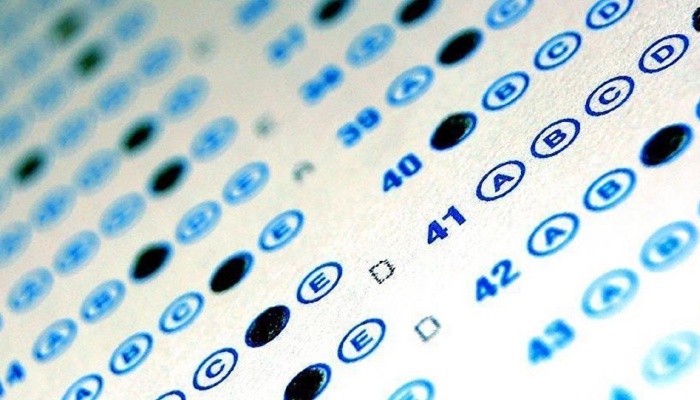Turkey’s main opposition Republican People’s Party (CHP) filed a criminal complaint on Friday over alleged wrongdoing in the 2025 High School Placement Exam (LGS), amid growing accusations that test questions were leaked before the exam concluded and that extraordinary success rates in select schools may indicate systematic fraud.
CHP deputies Suat Özçağdaş, Gizem Özcan, Mühip Kanko and Süleyman Bülbül held a press conference in front of the Ankara Courthouse before formally submitting the complaint. The party accuses officials in the Ministry of Education of failing to secure the integrity of the exam and of attempting to cover up the issue.
“This year, 963,000 children took the LGS after months and years of effort,” said Özçağdaş. “While the exam was still ongoing, the LGS question booklet began circulating in WhatsApp groups. This was not just a photo but a full digital copy, accessible while students were still working on the second section.”
The LGS, administered annually to students seeking admission to prestigious high schools across Turkey, is one of the country’s most competitive centralized exams. In 2025 a record 719 students received perfect scores of 500 out of 500. By comparison, 352 students achieved full marks in 2024, and only 18 did so in 2018.
This sharp increase in top scores triggered widespread suspicion among educators, unions, parents and opposition politicians. Particular focus was drawn to the high number of perfect scores from Mahmut Celalettin Ökten imam hatip middle schools in Bursa, Antalya and Trabzon. According to nationalist opposition İYİ (Good) Party deputy Turhan Çömez, 46 of the 719 top scorers came from these three imam hatip schools alone.
“This is not just a bad smell. It is evidence of rot,” said Çömez, calling for a full investigation.
The Ministry of Education initially denied any security breach. On June 24 the ministry claimed that there was no issue undermining the integrity of the exam and described media allegations as “baseless and imaginary.” However, two days later, Education Minister Yusuf Tekin admitted in a televised interview that an investigation had been launched into a leak involving PDF images of a section while the exam was still underway.
Tekin stated that 29 people, including at least one school administrator, were under investigation. He insisted, however, that the materials circulating online were not official ministry PDFs and that “the claim that the questions were stolen is completely false.”
Despite this the ministry dismissed Özgür Türk, the director general of information technology who had served in the position for five years. He was replaced by Prof. Dr. Ersin Karaman. Critics argue that the removal contradicts the government’s assertion that no wrongdoing occurred.
The CHP’s Suat Özçağdaş said, “If everything is fine, why was your IT director dismissed? Why did you open an investigation into 29 people? You can’t claim there’s no problem while simultaneously launching disciplinary measures.”
Parliamentary questions submitted by the CHP, Peoples’ Equality and Democracy Party (DEM Party) and İYİ Party demanded the release of LGS data that had not been published since 2023, a breakdown of top scores by school and province, and clarification on whether any outsourcing was done in question preparation.
VELİ-DER, a parents’ association, said the education ministry had eroded public trust. “The publicized success rates of some private schools are implausible,” the group said in a statement. “Minister Tekin’s labeling of concerned parents as ‘malicious’ is an insult to public scrutiny.”
Education unions such as Eğitim-Sen echoed these concerns. “The LGS system fosters inequality,” the union said. “Rather than upholding pedagogy, it reinforces class and school-type segregation.”
President Recep Tayyip Erdoğan addressed the controversy during a speech on Thursday. “They immediately resorted to hostility toward imam hatip schools,” he said. “This is an attack on our children. Turkey is a country that stands out in terms of exam security.”
Erdoğan linked the accusations to broader opposition tactics, saying, “Those who failed at the ballot box are now trying to change the agenda with lies and slander.”
Critics, however, argue that the LGS controversy fits into a broader pattern of eroding meritocracy in public institutions. CHP deputy Özçağdaş emphasized the statistical improbability of such a surge in top scores. “Even statisticians say the chance of this happening is about 1 percent.”
The CHP called for the release of anonymized student performance data and full transparency in exam preparation procedures. “We must see if there are students who performed poorly for years but suddenly achieved perfect scores,” said Özçağdaş. “This is about trust in the system.”
The LGS crisis has also reignited comparisons with past cheating accusations, particularly those leveled at the faith-based Gülen movement after the 2010 KPSS (Public Personnel Selection Exam) scandal. While pro-government media and officials have long claimed that the movement infiltrated public institutions via exam fraud, only a single incident has ever been prosecuted, and that case resulted in limited convictions from a judiciary that many international observers regard as compromised.
By contrast the current LGS controversy includes digital forensic evidence, PDF timestamps and widespread institutional criticism. Yet the government has not acknowledged the scope of the issue and instead deflected criticism toward political opponents.
The disparity in treatment underscores the politicized nature of Turkey’s exam fraud discourse. Accusations directed at the Gülen movement led to a sustained smear campaign despite little to no evidence, while systemic questions about present-day exam integrity, backed by data and internal ministry actions, are downplayed.
As 963,000 students await placement results on August 4, there is a growing sense of mistrust in Turkish government institutions among the public.

